 Petzlover
Petzlover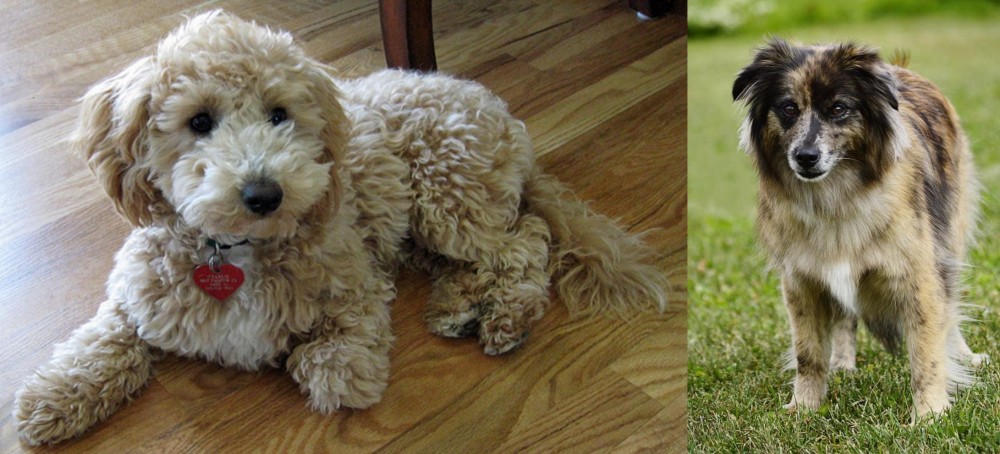 Bichonpoo is originated from Australia but Pyrenean Shepherd is originated from Spain. Bichonpoo may grow 15 cm / 5 inches shorter than Pyrenean Shepherd. Bichonpoo may weigh 12 kg / 26 pounds lesser than Pyrenean Shepherd. Both Bichonpoo and Pyrenean Shepherd has same life span. Both Bichonpoo and Pyrenean Shepherd has almost same litter size. Bichonpoo requires High Maintenance. But Pyrenean Shepherd requires Moderate Maintenance
Bichonpoo is originated from Australia but Pyrenean Shepherd is originated from Spain. Bichonpoo may grow 15 cm / 5 inches shorter than Pyrenean Shepherd. Bichonpoo may weigh 12 kg / 26 pounds lesser than Pyrenean Shepherd. Both Bichonpoo and Pyrenean Shepherd has same life span. Both Bichonpoo and Pyrenean Shepherd has almost same litter size. Bichonpoo requires High Maintenance. But Pyrenean Shepherd requires Moderate Maintenance
 This popular little dog was developed by crossing the Poodle with the Bichon Frise to create the Bichonpoo. They are also called the Poochon and sometimes called the Birchpoo. They are a soft, curly breed and they are extremely cute – a very cuddly breed. They are not recognized by the AKC, CKC or the UKC. Some other kennel clubs do accept them and welcome them into obedience and agility trials. The breed was originally developed in Australia as a household pet for those who want a “curly lap dog” that was hypoallergenic, did not shed and had a great temperament for life in families with children. They were first developed in the latter part of the 20th century.
This popular little dog was developed by crossing the Poodle with the Bichon Frise to create the Bichonpoo. They are also called the Poochon and sometimes called the Birchpoo. They are a soft, curly breed and they are extremely cute – a very cuddly breed. They are not recognized by the AKC, CKC or the UKC. Some other kennel clubs do accept them and welcome them into obedience and agility trials. The breed was originally developed in Australia as a household pet for those who want a “curly lap dog” that was hypoallergenic, did not shed and had a great temperament for life in families with children. They were first developed in the latter part of the 20th century.
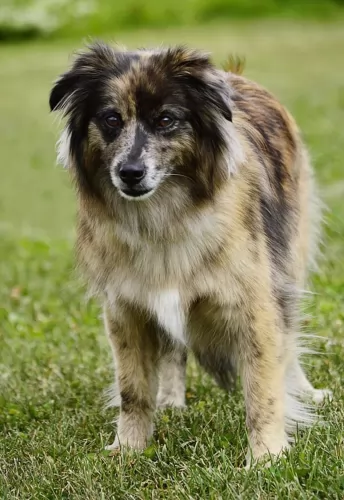 The Pyrenean Shepherd hails from Spain where he has always been used to herd sheep. Some people believe he is a descendant of the French Catalan Sheepdog while others say from the Briard. Nobody is too sure.
The Pyrenean Shepherd hails from Spain where he has always been used to herd sheep. Some people believe he is a descendant of the French Catalan Sheepdog while others say from the Briard. Nobody is too sure.
He is actually the smallest of the French herding breeds. It is interesting to note that he still does this herding job today. It was in the 19th century that a few of these dogs left for America with shepherds who found work herding flocks in the American West.
These dogs were also used in World War 1 as messenger dogs.
It was during the 1970's and 1980's that breeding programs were started for the dog and The Pyrenean Shepherd Club of America was formed in 1987. The dog was also recognized in 2009 by the American Kennel Club.
 This Bichon Frise-Poodle cross is a small dog with big personality. The original hybrid is 50% Poodle and 50% Bichon Frise. This is considered a first-generation hybrid. The second-generation hybrid is 50% Bichonpoo and 50% purebred Bichon Frise or Poodle. Then third generation hybrids are a cross between two second generation dogs. There is no fourth generation and most breeders do not offer even a third generation. The original hybrid can be healthier than the parents, but any flaws tend to show up in 2nd generation hybrids and it gets worse with third generation. This dog should be hardy, well-proportioned and robust. They are small, sweet and sturdy. Because there are three different sizes of Poodles, there can be three different sizes of the Bichon Poo – Standard, Mini and Toy.
This Bichon Frise-Poodle cross is a small dog with big personality. The original hybrid is 50% Poodle and 50% Bichon Frise. This is considered a first-generation hybrid. The second-generation hybrid is 50% Bichonpoo and 50% purebred Bichon Frise or Poodle. Then third generation hybrids are a cross between two second generation dogs. There is no fourth generation and most breeders do not offer even a third generation. The original hybrid can be healthier than the parents, but any flaws tend to show up in 2nd generation hybrids and it gets worse with third generation. This dog should be hardy, well-proportioned and robust. They are small, sweet and sturdy. Because there are three different sizes of Poodles, there can be three different sizes of the Bichon Poo – Standard, Mini and Toy.
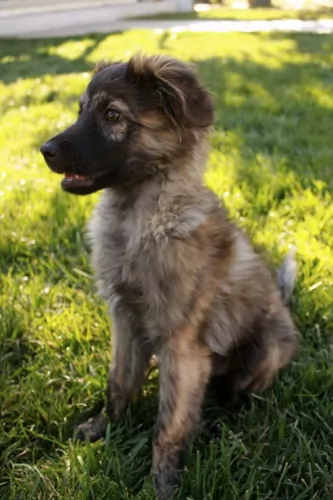 The Pyrenean Shepherd is a medium-sized dog standing at between 38 and 50cm in height and weighing between 14 and 20kg.
The Pyrenean Shepherd is a medium-sized dog standing at between 38 and 50cm in height and weighing between 14 and 20kg.
His head is fairly small with large, bright, expressive eyes. The ears are semi-erect. The tail has always traditionally been docked but often left long these days.
He comes with two different coat types – rough and smooth with sometimes both types being in the same litter. The dog is a regular shedder. The coat can be medium length or long and slightly wavy with a harsh texture. The coat can be of the shorter type with finer, softer hair. The coat is available in different colors and patterns, and can be a fawn color or grey and you will find a black overlay occasionally with some white. The coat can be tri-colored or he can be in solid colors such as cream or white.
Your feisty Pyrenean Shepherd is a dog with plenty of personality. He is also full of energy and will love to live with a outdoorsy-type family who are always on the go, because he’s in on everything.
He is distrustful of strangers and this together with the fact that he is so alert, makes him a splendid watchdog too.
He will need to be trained and socialized as he can be overly robust. He becomes obedient and well mannered, being totally dedicated to his owner. It isn’t easy for him to be separated from his beloved human owner.
 The Bichonpoo is affectionate, intelligent and active just as you might expect from a Poodle/Bichon Frise cross. He loves people and lives well with other animals. He is particularly fond of children and loves to play with gentle older children. However, the temperament and characteristics of the hybrid are not as predictable as their parents. The characteristics of the Bichonpoo depends upon its lineage – if it is first generation, second generation or third generation. With each successive generation there is less predictability in the characteristics of the individual dog. Regardless of generation, the Bichonpoo will need exercise and mental stimulation. They are loving, good-natured and accommodating to their environment. They want to be with their owner and can get very attached.
The Bichonpoo is affectionate, intelligent and active just as you might expect from a Poodle/Bichon Frise cross. He loves people and lives well with other animals. He is particularly fond of children and loves to play with gentle older children. However, the temperament and characteristics of the hybrid are not as predictable as their parents. The characteristics of the Bichonpoo depends upon its lineage – if it is first generation, second generation or third generation. With each successive generation there is less predictability in the characteristics of the individual dog. Regardless of generation, the Bichonpoo will need exercise and mental stimulation. They are loving, good-natured and accommodating to their environment. They want to be with their owner and can get very attached.
Depending on their parents they can be anxious and high strung like the Poodle or nippiness and ‘small dog syndrome’ of the Bichon Frise. Separation anxiety can be a major issue with this breed. Do not let your Bichonpoo become dominate in your home or they will assume the alpha position and become very bossy, especially with children. He is easy to train and a good watchdog as well.
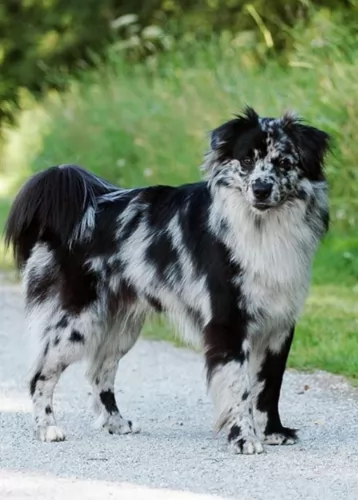 The Pyrenean Shepherd is essentially a one-person dog, becoming totally attached to one particular person in the family.
The Pyrenean Shepherd is essentially a one-person dog, becoming totally attached to one particular person in the family.
He is known as a dog who becomes totally loyal to his human family, getting on well with children as well as with other pets in the home.
He is aloof and wary of strangers. Training and socialization is important so as to avoid aggression and fear. This is one dog that requires being diligently exercised every day.
He is a great watchdog, and when you add up all his fantastic qualities, you get to realize what a splendid companion and pet this wonderful dog makes.
 The Bichonpoo is usually healthier than either the Poodle or the Bichon Frise. At the same time, they could inherit any of health concerns of either of their parents in the first generation Bichonpoo. They are however likely to develop ear infections and skin allergies. Cleaning and grooming is essential, especially the ears, but also to prevent matting which could lead to skin infections.
The Bichonpoo is usually healthier than either the Poodle or the Bichon Frise. At the same time, they could inherit any of health concerns of either of their parents in the first generation Bichonpoo. They are however likely to develop ear infections and skin allergies. Cleaning and grooming is essential, especially the ears, but also to prevent matting which could lead to skin infections.
 The Pyrenean Shepherd is such a jovial little dog that you just can’t imagine him ever being sick. When he is lethargic, you'll know there is something seriously wrong with him because he is always as bright as a button.
The Pyrenean Shepherd is such a jovial little dog that you just can’t imagine him ever being sick. When he is lethargic, you'll know there is something seriously wrong with him because he is always as bright as a button.
He can however get sick, and there are a few dog illnesses such as epilepsy, eye problems and hip dysplasia that can be very painful ad debilitating for such an energetic dog. You don’t have to be too concerned though, as he is a dog known to have minimal health issues.
 The Bichonpoo is an energetic little dog and needs enough nutrition to keep up with his needs. Feed a Bichonpoo at least twice a day – small meals- and dry food because of dental issues. A high-quality food will help to prevent allegories.
The Bichonpoo is an energetic little dog and needs enough nutrition to keep up with his needs. Feed a Bichonpoo at least twice a day – small meals- and dry food because of dental issues. A high-quality food will help to prevent allegories.
The Bichonpoo is the product of the poodle who is prone to bloat and Addison’s Disease and the Bichon Frise who is susceptible to Patella luxation, progressive retinal atrophy and liver shunts. The first generation Bichonpoo should be free of these health concerns. You should be aware that there is a possibility that the first-generation hybrid could contract any of its parents’ illnesses or deficiencies.
This hybrid is a high energy dog and needs daily exercise in the form of walks and play. They have the intelligence and skill of the Poodle with the energetic desire to play of the Bichon Frise. They need toys and a person to play with. She will need to be both mentally and physically stimulated. If she gets bored she will become destructive and noisy with barks and whines.
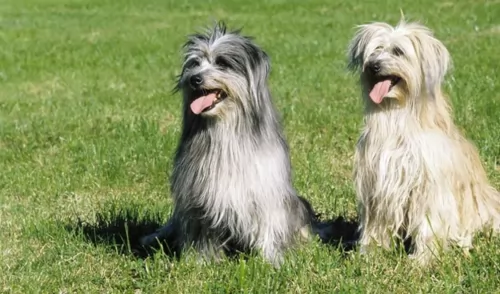 This will depend on the coat type. Both coat types will essentially require you brushing him twice a week.
This will depend on the coat type. Both coat types will essentially require you brushing him twice a week.
The Pyr Shep’s activity levels are very high and this dog will require living with people who love outdoor activities. He’s the perfect companion for those camping trips or hikes. He is always ready to join you on your walks and will be ready and waiting to jump right in when he sees you with a ball or frisbee.
For all that energy, your Pyrenean Shepherd will be needing the best dog food there is. Food full of preservatives and colorants can be bad for your pet, detrimental to his health.
Good food full of vitamins and minerals will ensure your pet stands a good chance of living a long, healthy life. If you feed him commercially manufactured dog food, ensure its the best there is, with labeling on the packaging that tells you its for his age, his size and energy levels.
Consistency and simplicity is what your Pyrenean Shepherd wants, and home-made food can enhance his dry kibble. Boiled chicken, brown rice or pasta and spinach, sweet potatoes and carrots all chopped up and mixed into the dry kibble once or twice a week will ensure your pet’s eyes are continuously bright and alert and his tail constantly wagging.
Some raw meat added in occasionally will also go towards ensuring his good health. Always make sure he has access to fresh, cool water.